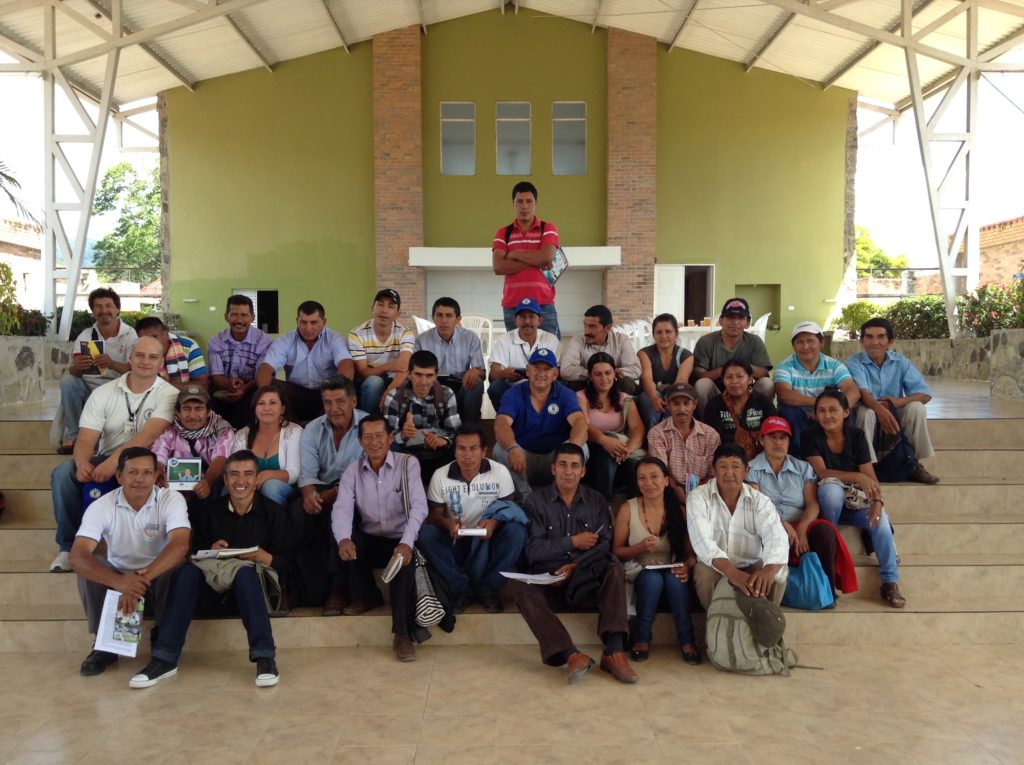We are temporary actors in the Coffeelands. Although CRS has been working for years in coffee origin countries (over 50 years of continued presence in Central America), projects are by their nature time bound interventions that are meant to create short and medium term benefits. Yet, our mission and the “big” goals of our work is to help generate empowered and resilient coffee producing communities who have living incomes and are stewards of sustainable landscapes. This work extends beyond the lifespan of a 3 to 5-year project. Therefore, the challenge and question posed at the outset is – how do we embed lasting sustainability and continued growth in a project from the start? In the Coffeelands, we deal with very complex scenarios with a panoply of actors and stakeholders, and our very big and real challenge is to provide enough technical assistance to sufficiently build and upgrade participant capabilities and that create enabling environments that will allow permanent actors in those territories to take these roles, allowing for growth beyond our humble but well intentioned efforts.
Let’s take a closer look at the Colombian side of the Borderlands project to look at how we have attempted to engineer this. While what occurred in Nariño, Colombia these past few years under the auspices of the Borderlands program has been amazing (see more in this previous post), the true litmus test is coming up.
For the 2017 harvest, the training wheels come off and the newly formed groups will commercialize their coffee with very limited help from the project. Borderlands has closed and the staff that remain are helping with phase out activities. The project was a success, having met the project objectives, and yet, the question remains: what will be the impact of the project in the subsequent harvests? How can we ensure continued growth and lasting sustainability for Borderlands participants?
CREATE SOCIAL CAPITAL FIRST, THEN CREATE ORGANIZATIONS
Modern value chains are not truly “chains,” which implies a linear structure, but rather complex networks with diverse actors that have different roles, knowledge, visions, aspirations and power (political and economic). In the supply network, smallholder farmers are at one end and hold very little power. Smallholder farmers working individually face severe constraints in accessing basic services, such as inputs (fertilizer, seeds) and technologies (machinery and knowledge) that would increase their productivity. They are unable to leverage the economies of scale needed to engage in modern market systems. As lone actors, smallholder farmers are unable to create relationships with actors, and with no platforms from which to advocate for change, they are (usually) unable to influence the systems and structures. One of the answers to this issue is the farmer organization.
We believe that by generating social capital and then forming organizations built upon real social bonds creates a more sustainable platform for lasting development. We think this process creates organizations that can continue their own development, and engage in relationships with other value chain actors.
In Nariño we helped first to build social capital before creating coffee organizations. It is this social capital that lays the groundwork for the subsequent creation of social cohesion that in turn enables and provides exposure to organizational development processes that allows smallholder producers to build trust and cooperation among themselves to plan and implement collective actions, which are fundamental to accessing services and markets. Moreover, these groups built upon trust and cooperation took place in a coffee landscape that were traditionally characterized by individualism (in the baseline survey, 96% of our farmers in Borderlands recognized themselves as a solitary actor in the coffee business in 2012).
Our secret weapon to catalyze organizational structures was the promotion of CRS’ SILC (Savings & Internal Lending Communities) methodology (which we previously wrote about here). Using this community-based savings/microfinance model, we helped form savings groups that modeled the characteristics of a functional, efficient and sustainable organization or enterprise: transparency, accountability, leadership, responsibility, empowerment, good governance.
After 6 months of meetings, the SILC groups began to organize themselves to engage in the direct-trade market models with our advisory council members. The groups had to aggregate to meet the volume and quality demands of the buyers. One example of an organization born from aggregated SILC groups is Agrounidos, located in the municipality of La Florida. This organization was able to develop a relationship with Counter Culture Coffee that started with a few pounds in 2013. In 2016 the volume sold by Agrounidos to Counter Culture was counted by the number of containers.
Urcunina, the name or “brand” create jointly by the organization and Counter Culture, is a high-quality coffee blend that reflect the intention to create sustainable business models that shares value more equitably among actors in supply chains. Agrounidos, Caravela (the exporter-importer), and Counter Culture have created a complex relationship that is based on shared and high levels of understanding of: price setting, coffee quality analysis, export logistics, traceability and profitability. Individually, these farmers would not have been able to create a business that is projected to sell six containers for the 2017 harvest. The challenge is to continue to grow – in volume, but more importantly, as an organization capable of providing high quality coffee and engaging in beneficial relationships with multiple actors in this value chain. We are hoping for the best, knowing that the foundations of these organizations are already steeped in value creation – the creation of social capital.



